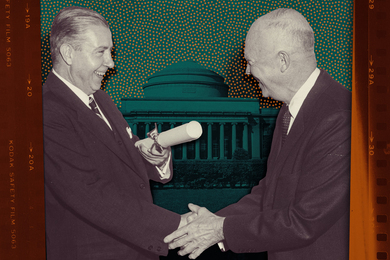How does a teenager morph into one of the world's top scientists in just a few short years? What happens between the time an MIT student first walks down the Infinite Corridor as a prefrosh and the moment she begins inventing robots, mapping genes or designing satellites?
Mind and Hand: The Making of MIT Scientists and Engineers, an exploration of an MIT education from the student perspective, opens at the MIT Museum on Thursday, June 7.
"Mind and Hand will not be a dry survey of educational history but more of a living exhibition, giving visitors the opportunity to time travel through student life and learning from the mid-1800s when the school was founded to 2001 and beyond," said Deborah Douglas, the museum's curator of science and technology.
According to Ms. Douglas, the common denominators of an MIT education are "disciplined creativity" and "learning by doing." MIT's founder William Barton Rogers espoused a radical educational philosophy. While most American universities taught science through lectures and demonstrations, he and the early faculty believed the laboratory was more important than the lecture hall. Even as the Institute transformed itself into a major research university and the problems to be solved changed dramatically, those precepts still drove the educational philosophy and continue to do so today.
From radar and rockets, slide rules and spectroscopes, this multimedia exhibition features unusual artifacts from the MIT Museum collections, rare photographs, video and sound recordings and hands-on demonstrations that reveal the dynamic, imaginative and fiercely competitive environment in which MIT students, faculty and staff work and study.
Mind and Hand is a long-term installation. For more information, call the exhibition hotline at x3-4444.
A version of this article appeared in MIT Tech Talk on June 6, 2001.





